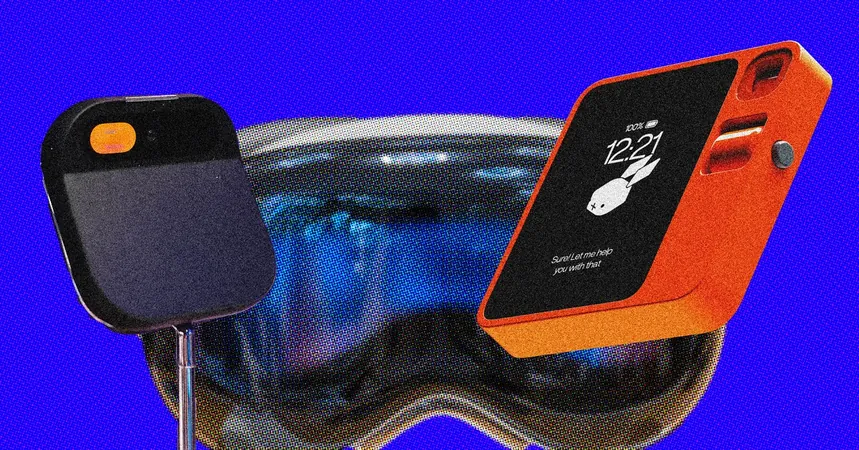
The 2024 Tech Triple Threat: A Deep Dive into Epic Hardware Fails
2024-12-27
Author: Ming
The Rise and Fall of the AI Companion: Rabbit R1
In January 2024, excitement surged as Rabbit’s CEO Jesse Lyu introduced the R1: a pocket-sized AI assistant that boasted the ability to manage everything from ordering rides to answering your most pressing questions. It was immediately met with hype, prompting swift sales of around 100,000 units by March. However, once the excitement faded, the reality set in. Critics quickly slammed the R1 for its lack of functionality, revealing that its sophisticated features were little more than a simple Android app dressed in brightly colored hardware. Reports of critical security issues didn’t help, and soon consumers were returning their devices en masse.
As of now, Rabbit's efforts to recover the R1 through updates have seen varying degrees of success. New features aimed at improving third-party integrations and usability were introduced, but many users remain frustrated with the device's fundamental limitations. The glowing marketing promised, but the R1 delivered disappointment.
Apple’s Ambitious Gamble: Vision Pro
Apple staked its reputation on the Vision Pro, a $3,499 mixed-reality headset that promised to redefine entertainment and workspaces. Rolling out with tremendous fanfare, it quickly became a topic of conversation among tech enthusiasts. However, initial shipments were slashed from 700,000 units to between 400,000 and 450,000, signaling a less-than-authentic response from the market.
The Vision Pro showcases cutting-edge technology that effectively immerses users in a digital experience, yet its exorbitant price makes it a hard sell, particularly when more accessible alternatives, like the Meta Quest, boast rich functionalities for a fraction of the cost. The presumption that consumers would embrace wearing headsets in social settings proved unexpectedly misguided for the tech titan.
Yet, don’t count Apple out just yet! Ongoing software updates have been released, enhancing the Vision Pro experience with richer interactive content. Sadly, many continue to wonder if such an extravagant purchase is genuinely worthwhile.
Humane’s Ambitions Come Crashing Down: Ai Pin
Later in the year, Humane's Ai Pin, designed to be worn on one’s clothing, promised an innovative approach to AI assistance. Despite generating buzz, it faced harsh criticism upon release for underwhelming performance and overheating issues. The initial public excitement quickly turned to disillusionment as returns began to outpace sales.
Humane attempted to pivot by pushing for a focus on licensing its innovative CosmOS operating system, though results remain elusive. Users report improvements following a stream of updates, including enhanced functionality and supposedly increased performance, but the feeling persists that even with enhancements, the Ai Pin is a cumbersome device compared to the streamlined capabilities of smartphones — voice assistance included.
Conclusion: Hope Springs Eternal?
Despite the disheartening feedback and less-than-stellar sales, all three products are still available for purchase as companies strive to recover from their launches. Efforts to resolve major flaws and roll out new features are ongoing, but for many consumers, the initial hiccups have tainted the experience.
As anticipation builds for the next generation of hardware in 2025, including soon-to-arrive alternatives from Google and Samsung, the lessons learned this year may serve as a guide for future developments: technology must not only impress marketers but meet real-world expectations. For now, these once-celebrated products serve as reminders of the fine line between innovation and disappointment in the fast-paced tech landscape.





 Brasil (PT)
Brasil (PT)
 Canada (EN)
Canada (EN)
 Chile (ES)
Chile (ES)
 España (ES)
España (ES)
 France (FR)
France (FR)
 Hong Kong (EN)
Hong Kong (EN)
 Italia (IT)
Italia (IT)
 日本 (JA)
日本 (JA)
 Magyarország (HU)
Magyarország (HU)
 Norge (NO)
Norge (NO)
 Polska (PL)
Polska (PL)
 Schweiz (DE)
Schweiz (DE)
 Singapore (EN)
Singapore (EN)
 Sverige (SV)
Sverige (SV)
 Suomi (FI)
Suomi (FI)
 Türkiye (TR)
Türkiye (TR)